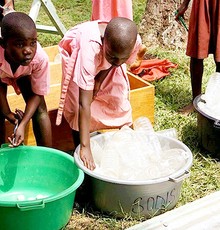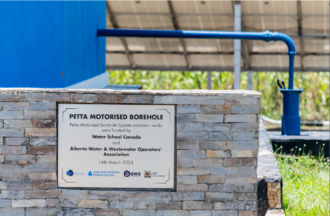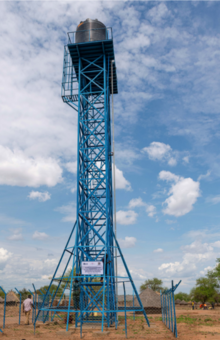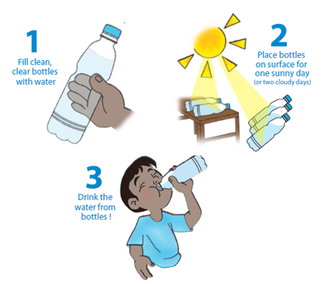Giving the Gift of Clean Water

Clean water for school children
AWWOA members have first-hand knowledge of the importance of safe drinking water and proper sanitation. Therefore, they support charitable organizations that directly tackle community problems related to bad water. Monies collected through member fund raising are donated to The Water School, a global, non-profit organization dedicated to providing safe water and sanitation solutions in developing nations.
Here is a video from the Water School, celebrating AWWOA's ongoing support and the results of our charity work.
Charitable Donations 2025
Our past Banff Seminar celebrated 50 years of the event . . for those of you who were not around when this event started, all I can say is it’s been a great 50 years!
I would like to take this opportunity to thank all who have donated to the AWWOA charitable events over the past year. This, of course, includes our fantastic suppliers who generously sponsored and donated to our functions.
Thank you to everyone who participated in the 50/50 draws, both at the Water Week Conference and the Banff Seminar, the Golf Tournament events and the Banff Seminar Silent Auction!
In 2024, our Charitable Donations project covered the expansion of a motorized borehole in Petta, Uganda, covering a distance of 4.5 kms.
This year, our goal was to further extend the distribution system in Kucwiny, Uganda.
The expansion will now include a further 12.6 kms of piping, providing an additional 770 households in 12 villages with access to safe, clean water.
Again, this year the Water School matched your donations dollar-for-dollar!
Our goal was to raise $30,000. We managed to surpass our expectations and raise $31,236. This equates to a donation of $62,472.
As always, thanks for your thoughtfulness and generosity!
Best Regards,
Bert E. Miller, Charitable Donations Chair
Petta Borehole Extension Report 2024

Plaque at the site of the project.
AWWOA's most recent Charitable Donations project was funding the expansion of a motorized borehole in Petta, Uganada. It has a pumping capacity of 36m3 and a daily reservoir capacity of 40 m3.
With your support, the extension has covered a distance of 4.5 kms with 6 public stand pipes in 6 villages and a yard connection at Mbula Primary School. A total of 5,625 community members and 2,310 pupils now benefit from the water system.
Click here to view the full report.
The Joy of Clean Water

Solar-Powered Borehole
Over the years, you have supported WaterSchool to teach rural Ugandans how to make their drinking water safe using the power of the sun with the SODIS (solar disinfection) method. Thank you for your support — particularly for your generosity last year.
Together, we have reached over a million people with this simple life changing technology.
SODIS has worked well in most places across Uganda where there is plentiful, but contaminated, surface water. But what about the places where it seldom rains? What happens to communities where surface water is scarce?
With your generous support last year, we started tackling this challenge by tapping into deep underground aquifers and bringing this water to the surface of communities in Uganda's dry corridors using solar-powered pumps.
This past November, I travelled to Uganda and got to visit one of the communities where the solar-powered borehole that you helped to build was up and running - bringing clean, fresh water up to the surface.
How does a solar-powered borehole work?
A pump powered by a large solar array draws water up from an underground spring and pumps it into a 10 meter high water tower for storage. From the tower, there is enough pressure to send the water by gravity to tap-stands in villages several kilometres away where community members can access it.
The borehole I visited is producing more clean water than we had planned. Today, it pumps out 5,000 litres of water every hour – enough for all 5,000 people in the area's seven villages!
The community celebrated the grand opening of the system while I was there — choirs sang, bands played, and a play about clean water was presented. People were thrilled!
It can be hard to fully understand just how transformative this solar-powered borehole will be for the communities. The water families used to consume was not safe as it was often gathered from muddy ponds and stagnant streams shared with animals. So people — especially young children — were regularly sick from diseases like typhoid and dysentery, and struggled with diarrhea and dehydration.
With your help, this is no longer the case. With clean water at hand, there is no more wasted money on medicine for waterborne illnesses, no more missing school and work. There is plenty of water and best of all, it is clean.
Who will maintain the system?
One of the key parts of building the solar powered borehole has been establishing Water User Committees at each of the tap stands to manage the water points well and ensure longevity for the whole system. The committees have been trained on how to maintain the tap stands and the entire borehole system. Maintenance on the borehole system is funded by the small water-use fees each community member pays to the Committees.
Before I left, I headed to the tap stand and put my water bottle under the spigot, a beautiful stream of clean water gushed out — overflowing my bottle.
As I took a sip of the cool, fresh water, I reflected on how grateful I am for you and your enduring support.
Doug and our friends at AWWOA, thank you for jumping in and supporting WaterSchool to build solar-powered boreholes alongside our continued work in SODIS training and hygiene/sanitation education. Thank you for your generosity.
You are helping to change the future for the people in Uganda we serve — I'm so grateful.
Best,
Tony Woodruff
Africa Program Director, WaterSchool

Simple solar disinfection process
Solar Disinfection
The Water School program integrates sanitation education programs with Solar Disinfection (SODIS) technique which effectively and simply improves the quality of drinking water. Contaminated water is collected and placed in clear plastic pop bottles which are left in direct sunlight on a hard surface for one full sunny or two full days, if cloudy. The sun’s UV rays kill the micro-organisms in the water making it safe for human consumption.



